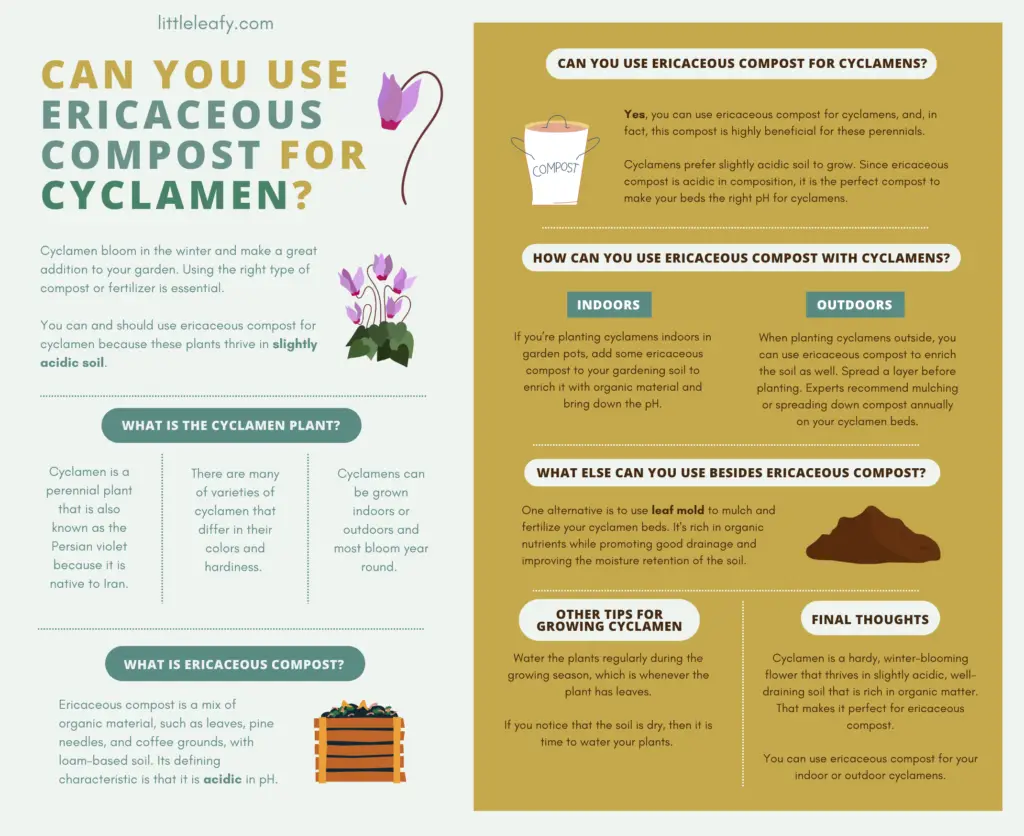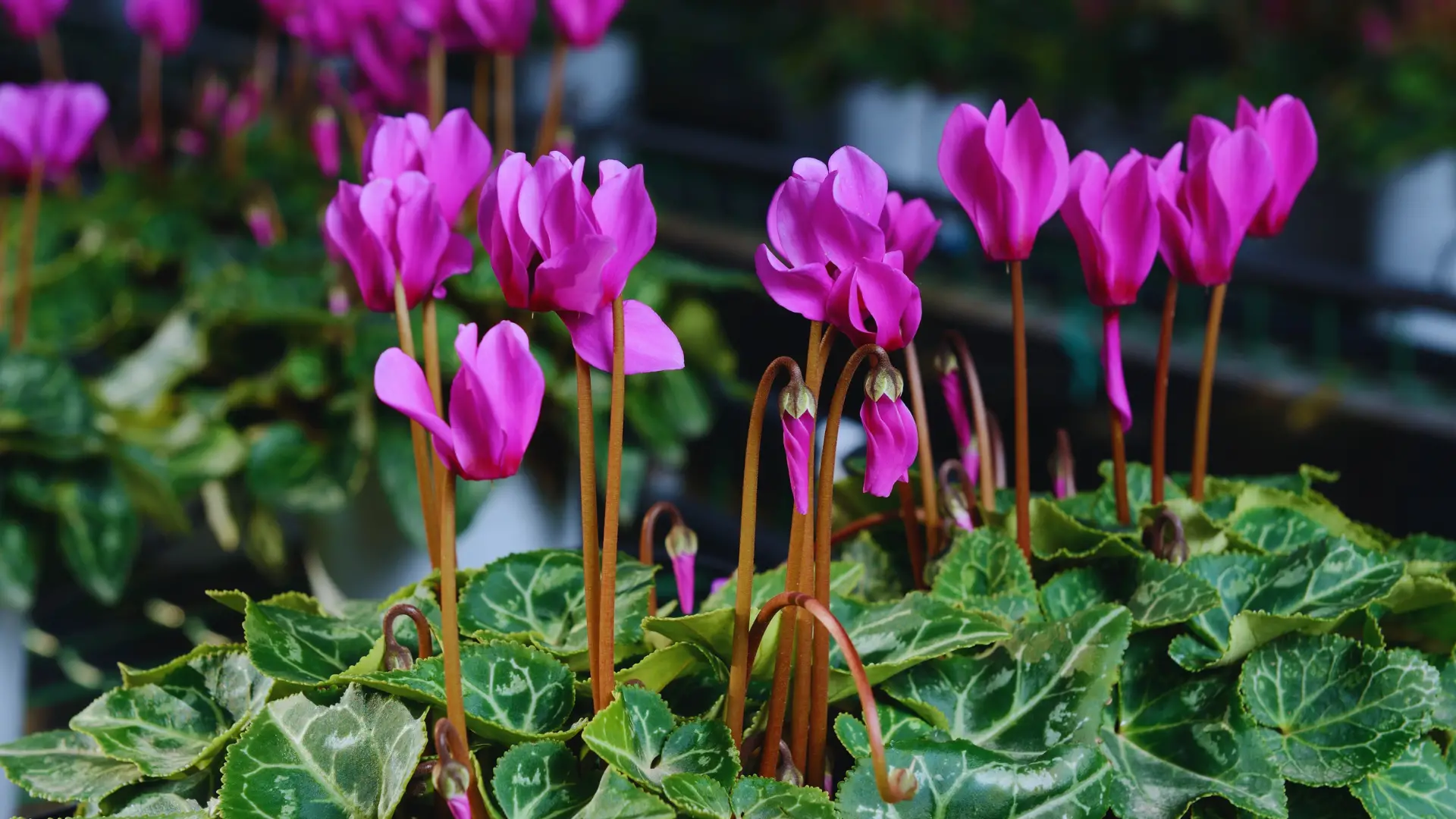Reading Time: 4 minutes 🍃
If you’re planting a garden with the goal of year-round blooms, cyclamen is one of the best flowers you can reach for. These hardy flowers bloom in the winter and make a great addition to your garden, especially as an accent in shady spaces.
Once you figure out how to care for them, they are easy to maintain. One of the keys to figuring out how to take care of cyclamen is using the right type of compost or fertilizer.
You can and should use ericaceous compost for cyclamen because these plants thrive in slightly acidic soil. If you don’t have ericaceous compost on hand, you can fertilize with leaf mold.
Here is your guide to cyclamen care, particularly regarding fertilization.

What Is the Cyclamen Plant?
Cyclamen is a perennial plant that is also known as the Persian violet because it is native to Iran and the Middle East, although some species also thrive in Europe and Somalia.
There are dozens of varieties of cyclamen that differ in their colors and hardiness. Almost all of them are perennial tubers, which means that they bloom every year, even after being cut down just to their tubular roots.
Cyclamens can be grown indoors or outdoors. The ones sold as houseplants are usually tropical cyclamens that prefer warmer weather. Outdoor cyclamens are much hardier and bloom in winter and early spring.
Don’t try planting outdoor cyclamens indoors or vice versa because the varieties thrive in nearly opposite weather conditions. Outdoor cyclamens droop at temperatures below 68 degrees Fahrenheit and wouldn’t enjoy life as a houseplant.
You can usually find cyclamens in the store around winter because people love using them to brighten up gardens during the off-season. Cyclamens go well under trees and shrubs or with bed neighbors that are also early bloomers.
What Is Ericaceous Compost?
Before going into if ericaceous compost is good for cyclamens, it’s important to define what it is.
Ericaceous compost is a mix of organic material, such as leaves, pine needles, and coffee grounds, with loam-based soil. Its defining characteristic is that it is acidic in pH, making it the ideal compost for plants, like honeysuckle, that prefer acidic soil.
You can plant ericaceous flowers directly into the compost if you’re using a garden pot or use the compost to change the pH of your beds.
Ericaceous compost has other benefits, including its high nutrient content and its ability to retain moisture and give soil good drainage. Many gardeners use it to feed their plants.
Can You Use Ericaceous Compost for Cyclamens?
Yes, you can use ericaceous compost for cyclamens, and, in fact, this compost is highly beneficial for these perennials.
Cyclamens prefer slightly acidic soil to grow. Since ericaceous compost is acidic in composition, it is the perfect compost to make your beds the right pH for cyclamens. The only exception is if your soil is already very acidic, as then adding ericaceous compost might make it too acidic for cyclamens.
You can figure this out before planting or laying down compost by doing a pH test on a patch of soil.
Ericaceous compost has other benefits for cyclamens. Cyclamens need soil rich in organic material, and since ericaceous compost is a mostly organic material, it enriches the soil enough so that cyclamens can thrive.
Cyclamens need lots of moisture but prefer well-draining soil so that their roots don’t get waterlogged. While ericaceous compost holds on to water, thanks to its high levels of organic material, it drains well, meeting the criteria that ensure good conditions for cyclamen.
How Can You Use Ericaceous Compost with Cyclamens?
You can use ericaceous compost with cyclamens growing indoors and outdoors. If you’re planting cyclamens indoors in garden pots, add some ericaceous compost to your gardening soil to enrich it with organic material and bring down the pH.
When planting cyclamens outside, you can use ericaceous compost to enrich the soil as well. Spread a layer before planting. Because these plants are perennial and come back every year with the right care, experts recommend mulching or spreading down compost once a year on your cyclamen beds.
The best time to do this is when the leaves die down so you can nourish the plants as they are dormant.
What Else Can You Use Besides Ericaceous Compost?
While you can use ericaceous compost with cyclamen plants, you don’t have to if you don’t have any on hand. One alternative is to use leaf mold to mulch and fertilize your cyclamen beds.
This makes sense because ericaceous compost commonly contains leaves, so using leaf mold on its own should help. Leaf mold compost is also rich in organic nutrients while promoting good drainage and improving the moisture retention of the soil, creating the ideal conditions for cyclamen once their growing season arrives.
What Are Other Tips for Growing Cyclamen?
Besides planting them in the right soil and compost, cyclamens need other care, especially regular watering. Water the plants regularly during the growing season, which is whenever the plant has leaves.
If you notice that the soil is dry, then it is time to water your plants. Water from below the leaves or on the tray to avoid getting water on the leaves and stem, which causes rot.
When your cyclamen plant loses its leaves and looks like it’s dying, it’s actually just going dormant, which is how the plant makes it through warm weather. You can care for it during dormancy by watering sporadically so the soil doesn’t dry out completely and by preparing it with a layer of mulch.
Final Thoughts
Cyclamen is a hardy, winter-blooming flower that thrives in slightly acidic, well-draining soil that is rich in organic matter. That makes it the perfect plant for ericaceous compost.
You can use ericaceous compost for your indoor or outdoor cyclamens; just make sure that the other soil you are mixing it with isn’t also acidic. The right compost and regular watering can help your cyclamen thrive.
Sources
- https://www.rhs.org.uk/plants/cyclamen/growing-guide

- https://www.seasonalgardening.co.uk/bulbs/cyclamen.asp

- https://www.thespruce.com/how-to-care-for-cyclamen-1402644#:~:text=Cyclamen%20prefers%20to%20grow%20in,soil%20to%20raise%20the%20acidity
 .
.

